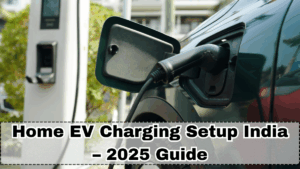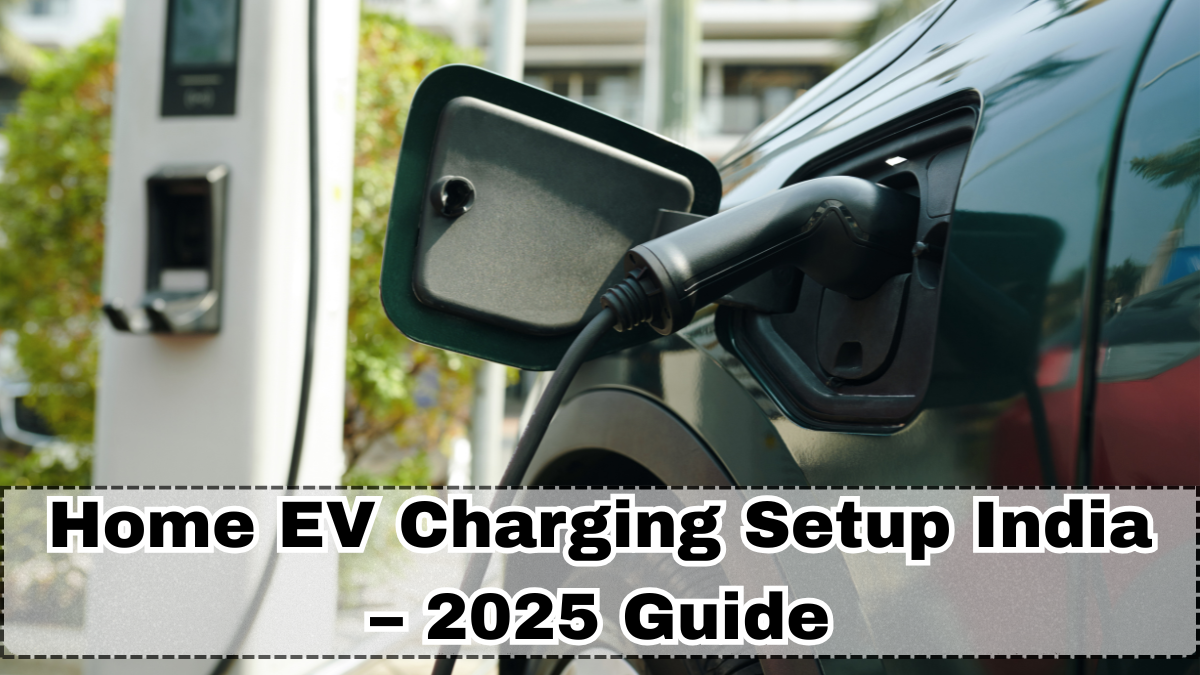With the rapid rise of electric vehicles across India, installing a reliable home charging system has become one of the most important steps for new EV owners. Home EV Charging Setup India is now a trending topic as more people shift to electric cars, scooters, and bikes. Instead of depending on public stations, having a personal home ev charger ensures convenience, faster charging, and long-term cost savings. As the EV ecosystem becomes stronger in 2025, home charging solutions have evolved with smarter features, better energy efficiency, and easier installation.
Most EV owners today prefer home charging because it offers flexibility — charge overnight, avoid queues, and maintain the battery health of your vehicle. From choosing the right charger to understanding electrical load requirements, this guide walks you through everything needed for a smooth setup at home.

Why Home EV Charging Matters in 2025
Home charging is essential for Indian EV users due to several reasons:
• Saves money compared to commercial charging
• Ensures overnight charging without waiting
• Keeps battery performance stable
• Ideal for daily city driving
• Reduces dependency on public chargers
• Works well for households with multiple EVs
With the growing number of electric cars under ₹20 lakh, demand for Home EV Charging Setup India is at an all-time high in 2025.
Types of Home EV Chargers in India
Understanding charger types helps you pick the best home ev charger for your needs.
1. Level 1 Charger (Regular 3-Pin Plug)
• Comes bundled with most EVs
• Slowest charging option
• Good for scooters and low-range cars
• Charges 8–10 km range per hour
2. Level 2 AC Charger (Fast Home Charger)
• Requires dedicated wiring and MCB
• Provides 20–30 km range per hour
• Ideal for daily EV car users
• Commonly used by Tata, MG, Hyundai EV owners
3. DC Wall Charger (Premium Fast Charging)
• Expensive but extremely fast
• Typically 7–15 kW output
• Suitable for premium EVs
• Not required for small-to-mid EVs
Most Indian homes prefer a 7.4 kW AC fast charger for everyday use.
Electrical Requirements for Home Installation
Setting up Home EV Charging Setup India requires basic electrical preparation:
• Load Capacity
Ensure your home meter has enough sanctioned load.
Typical requirement: 3–7 kW for AC chargers.
• Dedicated Circuit
A separate line from the meter board prevents overload.
• Proper Earthing
Critical for safety and avoiding voltage fluctuations.
• High-Quality Wiring
Use ISI-marked cables and weatherproof conduits.
• MCB & RCCB Protection
Protects your home and EV during power surges.
Your EV manufacturer usually provides inspection support to guide your home setup.
Installation Cost of Home EV Chargers in India
The cost of a home ev charger in India varies depending on the brand and power rating.
Approximate Costs in 2025:
• Basic 3.3 kW AC Charger: ₹8,000 – ₹18,000
• 7.4 kW Fast Home Charger: ₹25,000 – ₹45,000
• DC Wall Charger: ₹1 lakh – ₹2.5 lakh
• Installation Charges: ₹2,000 – ₹6,000
• Wiring & MCB Costs: ₹1,500 – ₹10,000 (depending on distance)
Most brands like Tata, MG, Hyundai, Mahindra, and BYD provide free chargers with EV purchase, but installation charges may still apply.
Best Home EV Chargers in India 2025
Here are the most reliable and popular home chargers:
1. Tata Power EZ Home Charger
• Available in 3.3 kW & 7.4 kW
• App monitoring and scheduling
• Ideal for Nexon EV, Tiago EV, Punch EV
2. Ather Grid Home Charger
• Great for scooters
• Compact and weatherproof
• Perfect for Ather 450X, TVS iQube
3. MG Charge+ Home System
• Smart AI-based load management
• Easy integration with MG ZS EV
4. Zeon Home Charger
• Fast installation
• Multiple power ratings
5. Delta AC Mini Plus
• One of the fastest AC chargers
• Suitable for premium EVs
These options make Home EV Charging Setup India easier and more efficient for users.
Where to Install the Charger at Home
Location plays a crucial role in performance and safety:
Best Locations:
• Car parking area
• Covered garage
• Wall-mounted outdoor space
• Near the meter box
Avoid:
• Exposed areas with heavy rain
• Narrow spaces without ventilation
• Areas far from the main electrical panel
Most EV users prefer wall-mounted chargers for easy cable management.
Smart Features in 2025 Home EV Chargers
Modern home ev charger units come with advanced smart features:
• Wi-Fi & Bluetooth Control
Monitor charging status from your mobile.
• Charging Scheduler
Charge during off-peak hours to save money.
• Load Balancing
Prevents overload by managing home electricity usage.
• Auto Shut-Off
Stops charging once the battery reaches full capacity.
• Energy Consumption Tracking
Helps understand monthly usage patterns.
These features enhance the overall charging experience.
Government Policies & Support in 2025
The Indian government is promoting Home EV Charging Setup India through:
• Reduced GST on chargers
• Subsidies under FAME II
• Support for building EV-ready societies
• Mandatory EV charging points in new apartments
• DISCOM support for load upgrades
These policies make adopting EVs more affordable.
Tips for First-Time EV Owners
• Avoid using extension cords
They can overheat and cause damage.
• Charge regularly
Maintains battery health.
• Clean connectors
Dust-free connectors ensure smooth charging.
• Monitor power consumption
Track monthly electricity usage for budgeting.
• Use original chargers
Avoid third-party chargers unless certified.
These practical tips help maintain long-term EV performance.
Future of Home EV Charging in India
By 2027, India will see major upgrades:
• Plug-and-charge seamless authentication
• Solar-powered home EV chargers
• Faster 15 kW domestic AC chargers
• Bidirectional V2H/V2G systems
• Fully automated robotic chargers
Home EV Charging Setup India is only the beginning of a massive EV revolution.
FAQs
How much does home EV charger installation cost in India?
Most installations cost between ₹2,000 and ₹6,000 depending on location and wiring needs.
Can I install a 7.4 kW charger at home?
Yes, provided your home has adequate sanctioned electrical load and proper wiring.
Do I need government approval for home chargers?
No separate approval is needed, but DISCOM approval may be required for load increase.
Can I charge my EV using a normal 3-pin socket?
Yes, but it is slow and not ideal for daily long-range EV usage.
How long does home charger installation take?
Typically 1–3 hours after inspection.
Click here to know more.
